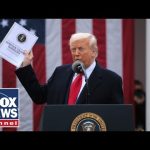Peter Navarro, a senior trade advisor to President Trump, has reignited the national conversation on trade policy, labeling America’s current trade situation as a “national emergency.” Speaking on a conservative news channel, Navarro outlined the administration’s sweeping tariff strategy, dubbed “Liberation Day,” as a necessary corrective to decades of unfair trade practices. These practices, he argues, have hollowed out America’s manufacturing base, cost millions of jobs, and transferred wealth to foreign nations. Navarro’s message is clear: the United States must take bold action to reclaim its economic sovereignty and restore its industrial strength.
At the heart of Navarro’s argument is the assertion that America’s trade deficits are not merely economic statistics but evidence of systemic exploitation by foreign nations. Countries like China, Japan, and Germany have employed non-tariff barriers—such as currency manipulation, export subsidies, and discriminatory regulations—that undermine American competitiveness. These tactics exacerbate trade imbalances and erode the U.S. industrial base, threatening not only economic prosperity but also national security. Navarro warns that without decisive action, America risks losing its ability to produce critical goods domestically, leaving the nation vulnerable in times of crisis.
Navarro also aimed past trade agreements like NAFTA and China’s entry into the World Trade Organization (WTO), which he described as catastrophic for American workers. NAFTA alone displaced hundreds of thousands of manufacturing jobs as companies relocated production to Mexico in search of cheaper labor. Similarly, China’s WTO membership enabled it to flood U.S. markets with low-cost goods while decimating American industries. Navarro criticized economists and media outlets that championed these agreements, accusing them of ignoring their devastating impact on middle-class families. His remarks underscore the administration’s belief that previous trade policies prioritized corporate profits over national interests.
The Trump administration’s new tariffs represent a stark departure from this legacy of globalist trade policies. Beginning April 5, a universal 10% tariff will apply to all imports, with additional country-specific tariffs as high as 50% targeting nations with significant trade imbalances or unfair practices. While critics warn that these measures could spark a global trade war or increase consumer prices, Navarro insists they are essential for leveling the playing field and incentivizing domestic production. He emphasized that these tariffs are not merely taxes but tools for economic revitalization—aimed at creating jobs, stabilizing prices, and rebuilding America’s manufacturing capacity.
For many Americans, particularly blue-collar workers in industrial states, this tough stance on trade offers hope for a brighter future. Navarro’s vision aligns with President Trump’s broader “America First” agenda: prioritizing domestic industries, reducing dependency on foreign supply chains, and ensuring economic security for future generations. While challenges remain in navigating this bold strategy, the administration’s commitment to tackling unfair trade practices signals a long-overdue shift toward protecting American workers and restoring the nation’s economic strength.




